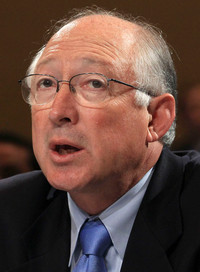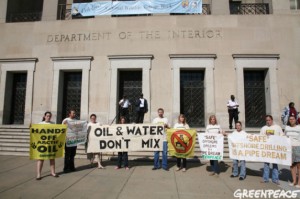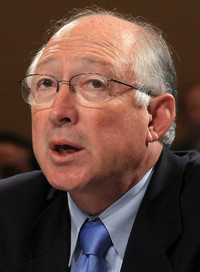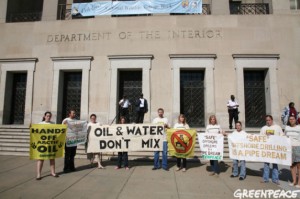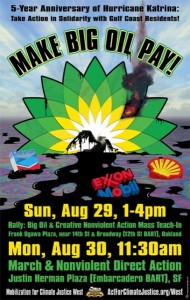This article originally appeared on AlterNet.
It is time to learn the lessons of the disaster: neither the technology nor the regulation of deepwater drilling is capable of protecting workers or the environment.
One year ago this month, the Deepwater Horizon drilling rig exploded 50 miles off the coast of Louisiana. This week we learned that the company’s CEO, Steven Newman, and other executives of Transocean, the owner and operator of the rig, were not only awarded raises, but also millions of dollars in bonuses for 2010 after “the best year in safety performance in our company’s history,” according to the company’s annual report and proxy statement.
News of the bonuses went viral and enraged the public. Within one day, announcements that the executives were donating the bonuses to families of the 11 men who died on the rig soon went viral as well.
While the contributions are certainly welcome, they are little more than a gesture. First, the contributions accounted for but a small fraction of the total bonuses the executives received (approximately $250,000 out of nearly $900,000, according to Fortune), and not a single executive turned down his or her raise.
The fact that Transocean awarded the raises and bonuses is more than an affront to the families and colleagues of the 11 men who died aboard the rig and the millions more who have suffered as a consequence of the 210-million-barrel oil gusher. They are also a warning.
Transocean is the largest deepwater driller in the world, operating nearly half of all rigs in more 3,000 feet of water in the Gulf of Mexico. All of the major oil companies rely heavily upon its services. If the ongoing fight for new offshore drilling in places like California (where I live) is lost by opponents, Transocean will unquestionably enter these new waters. Yet, investigations are sure to conclude that Transocean’s operational failures are as much to blame for the Deepwater Horizon disaster as are BP’s flawed managerial decisions. If Transocean has not learned the lessons of the largest oil disaster in American history, then we all have great reason to worry.
Since 2008, 73 percent of incidents that triggered federal investigations into safety and other problems on deepwater drilling rigs in the Gulf have been on rigs operated by Transocean, according to the Wall Street Journal.
“This event was set in motion years ago by these companies needlessly rushing to make money faster, while cutting corners to save money,” Stephen Lane Stone, a Transocean roustabout who survived the April 20 explosion, told a Congressional committee last May. “When these companies put their savings over our safety, they gambled with our lives. They gambled with my life. They gambled with the lives of 11 of my crew members who will never see their families or loved ones again.”
The results of that cost cutting were apparent all across the Deepwater Horizon — a rig leased by BP and run by Transocean. Of the 126 people on board the rig on April 20, 79 worked for Transocean. More tragically, of the 11 men who died that day, nine were Transocean employees.
Testimony from federal investigations reveals charges of literally hundreds of unattended repair issues on the Horizon. Transocean chief electronics technician for the rig, Mike Williams, described one as “the blue screen of death,” explaining that the computer screens regularly “locked up” with no data coming through, making it impossible for the drillers at those chairs to know what was happening in the well 18,500 feet below.
Williams also reported the failure to utilize the automatic alarm systems. On April 20, as gas rose from the Macondo well into the rig, the crew should have been automatically alerted and operations in their areas automatically shut in. Instead, the automatic gas alarms were intentionally inhibited, set to record information but not to trigger alarms.
More than a year before, Williams asked why. His superiors replied that they did not want people woken up “at three o’clock in the morning due to false alarms.” When Williams tried to fix the alarms, Transocean subsea supervisor Mark Hay reportedly told him, “The damn thing’s been in bypass for five years. Why did you even mess with it?” Hay said, “Matter of fact, the entire [Transocean] fleet runs them in bypass.”
Even without the alarms, the blowout preventer (BOP) should have shut in the well. But when the engineers in the drill room triggered it, the BOP failed to activate.
The rig has two additional backups. The first, the Emergency Disconnect System (EDS), triggers the BOP and separates the rig from the wellhead. The EDS was activated by the crew on the bridge, but again, nothing happened.
Federal regulations require BOPs to be recertified every five years. The Deepwater Horizon BOP had been in use for nearly 10 years and had never been recertified. Getting it recertified would have required Transocean to take the rig out of use for months while the four-story stack was disassembled and examined.
There were several problems with the BOP that were well known on the rig and had been reported in the BP Daily Operations Reports as early as March 10. Both BP and Transocean officials knew the BOP had a hydraulic leak. They also knew that federal regulations required that if “a BOP control station or pod … does not function properly,” the rig must “suspend further drilling operations” until it’s fixed.
When the BOP failed to activate from the floor and from the bridge, there should have been one more backup, the automatic mode function (AMF), but it failed, too. The reason, according to BP, is that the batteries had run down.
All across the Deepwater Horizon, the technology on which everything so dearly depends was failing, and with catastrophic results.
Rather than overhaul its safety system, Transocean declared that in 2010 “we made significant progress in achieving our strategic and operational objectives for the year,” but unfortunately, “these developments were overshadowed by the April 20, 2010 fire and explosion onboard our semi-submersible drilling rig, the Deepwater Horizon.”
Unfortunately, the public has allowed the events aboard the Deepwater Horizon and all that followed its explosion to be overshadowed as well. As we approach the one-year anniversary, it is time to learn the lessons of that disaster: that neither the technology nor the regulation of deepwater drilling is capable of protecting the workers on the rigs, the ecosystems within which they work, or those whose livelihoods are dependent upon those water ways and beaches.
As oil industry analyst Byron King has said, “We have gone to a different planet in going to the deepwater. An alien environment. And what do you know from every science fiction movie? The aliens can kill us.”
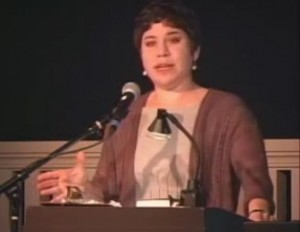 The Black Tide Book Tour hits Colorado tonight and tomorrow night, then wraps up in California for two final dates following a whirlwind tour that took author Antonia Juhasz throughout the US and over to London, England.
The Black Tide Book Tour hits Colorado tonight and tomorrow night, then wraps up in California for two final dates following a whirlwind tour that took author Antonia Juhasz throughout the US and over to London, England.

